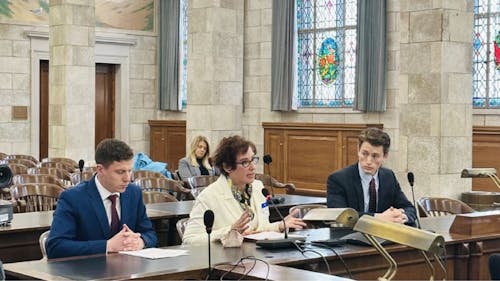Restraining order state law passes thanks to Rutgers Law School professor, alumni

Last month, Rutgers Law School professor Ruth Anne Robbins' work to codify more than decade-old court rulings that standardized aspects of the restraining order filing process came to fruition with the signing of Bill A-1475, according to a press release.
Obtaining a restraining order in the state of New Jersey is a three-part process under the Prevention of Domestic Violence Act of 1991 (PDVA), Robbins said. These proceedings are conducted in family courts.
First, plaintiffs must prove that they had some interpersonal relationship with the person they seek to issue the order for, such as a romantic relationship, familial relationship or even one with a college roommate.
They must then demonstrate that an act of violence was committed against them, Robbins said. Historically, under Section 19 of the PDVA, violent acts can include crimes such as sexual assault, kidnapping and robbery. Once they have done so, courts will consider a myriad of factors before issuing a ruling as to whether they believe a restraining order is required.
Robbins, alongside Rutgers Law students in her clinic and the New Jersey Coalition to End Domestic Violence, lobbied for Bill A-1475 for more than a year. Now, the law modifies the third part of the restraining order process, requiring proof of need in order to define coercive control.
Historically, New Jersey courts have approached coercive control subjectively, as there was no clear definition of what the phrase meant, Robbins explained. Judges often give it some consideration, but how much emphasis they place on it is contingent on what they consider to be abuse, she said.
"Any pattern of coercive control against a person that, in purpose or effect, unreasonably interferes with a person's free will and personal liberty, threatens or exploits a person's liberty, freedom, bodily integrity or human rights, with the court specifically considering evidence of the need for protection from immediate danger or the prevention of further abuse," the law reads.
The law also provides examples of what coercive control can manifest as, Robbins said. Coercive acts can look like repeatedly degrading someone, withholding their basic material needs or connections to their social network, over-regulating their actions and threatening to make unfounded reports to governing authorities like Immigration and Customs Enforcement.
"The idea of coercive control is to provide more examples of what we're talking about that are the hallmark of abusive control," she said. "So, the list (of examples) exists to help the judges, but it also exists to help people identify themselves as in an abusive relationship."
While the list drew criticism from opponents who thought it was too restrictive for judges, helping individuals recognize abusive relationships holds considerable value for both parties involved in a restraining order case, Robbins said.
She said litigants in these cases do not have the right to counsel, which is a longer-term advocacy initiative she is working on. Without a guarantee of counsel, parties often have to represent themselves due to financial or time constraints. Having examples of what qualifies as coercive control can assist them in doing so.
Being aware of coercive control can help people on college campuses as well, Robbins said. College students may be victims of the same crimes that can lead to a domestic violence restraining order by people they do not have relationships with, Robbins said.
In such cases, students can use the Victim's Assistance and Survivor Protection Act (VASPA) to obtain a restraining order.
"(VASPA is) not really well advertised on college campuses," she said. "It's just another reminder that people may really think that domestic violence is all about physical violence or sexual violence. In New Jersey, it is more than that. Recognize that you can be controlled by someone without any (physical act)."



